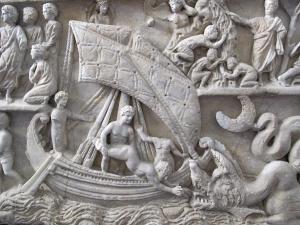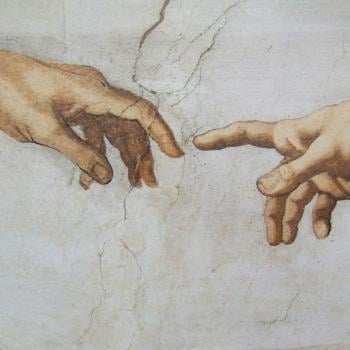
The book of Jonah demonstrates the difference between human conceptions of justice and how it influences the way people believe God’s justice should be like with the way God actually acts and promotes justice. We tend to expect retributive not restorative justice, while God always acts for the greater good, helping to restore, with mercy and grace, the justice or goodness which humans have denied. This difference is played out with Jonah; he thought his purpose was merely to condemn Nineveh, to tell them they were about to face God’s wrath for their sins and there was nothing they could do to prevent their destruction. The people of Nineveh heard what Jonah had to say, but hoped and thought their doom was not necessary if they changed their ways. They did penance, showing God their willingness to change their ways, asking God to give them another chance, that is, to be merciful towards them. God heard their pleas. Jonah had accomplished what God wanted him to accomplish, which was to effect such change, but Jonah did not understand, which is why he was upset with God:
But it displeased Jonah exceedingly, and he was angry. And he prayed to the LORD and said, “I pray thee, LORD, is not this what I said when I was yet in my country? That is why I made haste to flee to Tarshish; for I knew that thou art a gracious God and merciful, slow to anger, and abounding in steadfast love, and repentest of evil. Therefore now, O LORD, take my life from me, I beseech thee, for it is better for me to die than to live.” And the LORD said, “Do you do well to be angry?” (Jonah 4:1-4 RSV).
Jonah was angry. Before God’s demonstration of mercy, he felt God’s pathos, God’s “outrage” for Nineveh’s sins. He felt called to preached to the people of Nineveh, to speak against their evils, and yet he didn’t want to do so; he struggled against his calling, but God intervened, making sure he would not reject his calling. It is easy to understand why Jonah was angry. He felt that he had been duped by God. When he accepted his calling, he preached to the people of Nineveh, telling them that God’s judgment was about to bring about their destruction. He felt their doom was certain, and yet, what he preached did not seem to come to pass.
Jonah misunderstood the prophetic call; he was called to preach, and he was inspired by God’s pathos, but he did not understand the full pathos of God which included God’s love for all humanity. He did not comprehend God, but he thought he did, and so turned his apprehension into an absolute which it was not. He did not understand what he was doing was providing a conditional warning, indicating what would come to pass if things did not change; he assumed, as many assume with many similar types of prophecies in Scripture, it was not conditional but a necessary forgone conclusion. Christians continue to make the same kind of mistake when they read warnings about eternal perdition in Scripture, assuming that they represent what must come to pass instead of being a potential outcome for history. Prophetic warnings must be understood as conditional, indicating what will come to pass if things do not change; if they were not conditional, it would seem as such statements are a kind of gloating, an action contrary to the nature of God.
It would have been useless for Jonah to preach if Nineveh’s doom was certain. But, since it was conditional, God was able to use Jonah to change the situation. The people of Nineveh did not have to face “karmic retribution” for what they had done because they repented and pleaded for God’s mercy, mercy which they received. That mercy gave them the grace they needed so they could be transformed into something better. And, responding to Jonah, God revealed that God is looking to the world with great care and concern, as God loves everyone, and seeks every possible reason to show them mercy:
But God said to Jonah, “Do you do well to be angry for the plant?” And he said, “I do well to be angry, angry enough to die.” And the LORD said, “You pity the plant, for which you did not labor, nor did you make it grow, which came into being in a night, and perished in a night. And should not I pity Nineveh, that great city, in which there are more than a hundred and twenty thousand persons who do not know their right hand from their left, and also much cattle?” (Jonah 4:9-11 RSV).
God loves the world and those within it; it is through such love God made the world, and it with such love that God acts for the good of all creation. God’s love and mercy lies behind all of God’s interactions with the world. And as God is one, all of God’s actions, can be and should be seen as interconnected and one in such a way that, as Walter Kasper explained, “Mercy, of which we have just spoken, stands in an indissoluble inner connection with God’s other attributes, especially holiness, justice, fidelity, and truth.” [1] Denial of mercy is a denial of true justice, even as a denial of mercy leads to a denial of the absolute truth. For we know, it is love, not sacrifice, which God desires from us: “For I desire steadfast love and not sacrifice, the knowledge of God, rather than burnt offerings” (Hos. 6:6 RSV). Taking up these words, Jesus indicated what they mean:
But when he heard it, he said, “Those who are well have no need of a physician, but those who are sick. Go and learn what this means, `I desire mercy, and not sacrifice.’ For I came not to call the righteous, but sinners” (Matt. 9:12-13 RSV).
Sadly, many Christians have ignored this; they read Scripture with a legalistic hermeneutic. Like Johan, they end up thinking God’s justice has little to no room for mercy or grace. They focus on sins, and how and why sins are condemned, making them desire to see sins condemned for their sin. They hate sin for a legalistic reason. They do not understand why God hates sin, which is simple: because sin hurts those whom God loves. Condemnations of sin in Scripture must not be read outsider of the greater mercy God intends to bestow upon sinners. God intends to bless them with grace so that they can find themselves being restored to what they should have been like instead of being destroyed, for in their destruction, sin, not God, wins. Condemnations are given as a foundation for restorative justice, and so must be understood in the same was as Jonah’s mission to Nineveh is to be understood: they are to help people see the ways they have strayed from true justice, to accept, that is, the judgment of God’s justice, so that they are open to and willing to change. Then, they will be ready to receive the grace they need. That is, the purpose of such condemnation is never the condemnation itself. This is exactly the point God is making in and with the story of Jonah, as J.R.R. Tolkien realized:
Incidentally, if you ever look at the Old Testament, and look at Jonah, you’ll find that the ‘whale’ — it is not really said to be a whale but a big fish – is quite unimportant. The real point is that God is much more merciful than ‘prophets’, is easily moved by penitence, and won’t be dictated to even by high ecclesiastics whom he has himself appointed.[2]
Those who would use their authority to undermine mercy and grace, even if the authority is legitimate, even if what they say is based upon some element of the truth (like Jonah and his apprehension of some of God’s pathos), end up undermining the absolute truth because they reject God’s mercy. Ecclesiastical authorities, just like the prophet Jonah, might possess some sort of legitimate authority, but that authority should be used to help them be pastors, looking for the good of everyone. But, as we also see with Jonah, God can and will work for the good of everyone even through flawed ministers, which is one of the reasons why Donatism leads to the wrong conclusions about the sacraments. God will not be controlled or dictated by those who try to isolate some portion of the truth and use it to reject the greater, absolute truth. Mercy will not be denied, no matter how much some would like to limit it. And, as the sign of Jonah is the sign of Jesus’ ministry, we must understand it is the sign of mercy and hope: no matter how much it seems some might be destined to perdition, God’s mercy will always be ready to offer a way out of it, so that everyone has a chance to be saved :
For our Lord and Savior willed to illuminate all places in order to have mercy on all. He came down from heaven to earth in order to visit the world. He went down further to the lower world in order to illumine those who were being held in the lower world, in accordance with the statement of the prophet who said, “You who sit in darkness and in the shadow of death, a light has arisen for you” [Isa 9:2]. [3]
God is willing to pardon to everyone so easily, which St. Isaac the Syrian (apropos of Nineveh), beautifully stated:
But we possess a greater sense of God and we have an elevated knowledge of Him. Indeed, we know Him as one who pardons, who is good, who is humble. Even for one good thing <done>, if only in thought or compunction, He pardons the sins of many years. And the sins of others He does not remember, lest they be associated <with ours>. But even those who have died in their sins and passed over already, He rends asunder the greater part of their sins by means of His mercy. [4]
Mercy, indeed, is greater than God’s condemnation, as it will always be. This is why, if someone embraces mercy, that mercy will bring them grace and salvation:
But since “mercy will be exalted over condemnation” and the gifts of clemency will surpass any just compensation, all the lives led by mortals and all different kinds of actions will be appraised under the aspect of a single rule. No charges will be brought up where, in acknowledgment of the Creator, works of compassion have been found. [5]
Those mercilessly judge and condemn others risk having their own judgment brought back against themselves. This is not to say they will be condemned for eternity. God’s mercy is for all, and those who repent, even those who once did not give or show it to others, can receive it, but in receiving it, they will change and become merciful themselves. Restorative justice can embrace anyone and help them become the person God intended them to be. This is not to say the process of becoming what God wants anyone to be will be easy; it will not. They will have to become purified as if through a trial of fire, but in the process, their every defilement will be cleansed and they will become pure at heart and ready for the beatific vision. The story of Jonah, the sign of Jonah, therefore is the sign of mercy, and those who are upset when they see mercy is being offered to others should consider the words God gave to Jonah. They should remember that God is always at work, trying to restore the fallen world so that it, and all those in it, can be made fit for the kingdom of God.
[1] Walter Kasper, Mercy. Trans. William Madges (New York: Paulist Press, 2013), 88-9.
[2] J.R.R. Tolkien, The Letters of J.R.R. Tolkien. Revised and Expanded Edition. Ed. Humphrey Carpenter and Christopher Tolkien (Broadway, NY: William Morrow, 2023), 370 [Letter 196a to Michael George Tolkien].
[3] St. Chromatius of Aquileia, Sermons and Tractates on Matthew. Trans. Thomas P. Scheck (New York: Newman Press, 2018), 60 [Sermon 16].
[4] St. Isaac the Syrian, “The Third Part.” Trans. Mary T. Hansbury in An Anthology of Syriac Writers From Qatar in the Seventh Century. Ed. Mario Kozah, Abdulrahim Abu-Husayn, Saif Shaeen Al-Murikhi and Haya Al Thani (Piscataway, NJ: Gorgias Press, 2015), 387 [XI.5].
[5] St Leo the Great, Sermons. Trans. Jane Patricia Freeland CSJB and Agnes Josephine Conway SSJ (Washington, DC: CUA Press, 1996), 47 [Sermon 11].
Stay in touch! Like A Little Bit of Nothing on Facebook.
If you liked what you read, please consider sharing it with your friends and family!
N.B.: While I read comments to moderate them, I rarely respond to them. If I don’t respond to your comment directly, don’t assume I am unthankful for it. I appreciate it. But I want readers to feel free to ask questions, and hopefully, dialogue with each other. I have shared what I wanted to say, though some responses will get a brief reply by me, or, if I find it interesting and something I can engage fully, as the foundation for another post. I have had many posts inspired or improved upon thanks to my readers.













